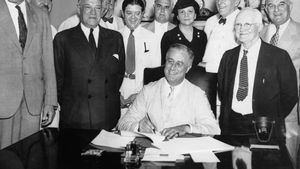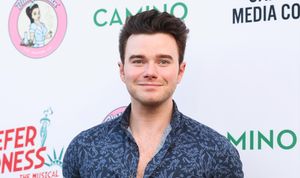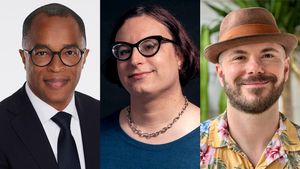If you're been online lately, you have probably seen the term "DL trade" thrown around a lot — but what does it really mean?
The word "trade" has become more and more popular lately, in part because of the popularity of RuPaul's Drag Race (and the ubiquitous "trade of the season"), and now, it seems like the entire queer side of the internet is using the term, even combining it with "DL" to make the new phrase "DL trade."
But what do these words actually mean? And where did they originate from?
What is "DL?"
DL is short for "down low" and is mainly used in the Black community to describe men who present as straight to the world, but sleep with other men.
According to Seth E. Davis in the Literacy in Composition Studies Journal, "in the early 2000s, the phrase DL would come to describe Black men who have sex with men while performing heterosexual personas in other parts of their lives."
What is "trade?"
@davidbrandynReplying to @Mz. Inky💜🦋🐺 Butch Queen Advice… what is the “trade”? #butchqueen #butchqueenadvice #lgbtq #lgbtqhistory
"Trade" has origins that can be traced all the way back to Polari, a form of slang used in Britain by gay actors, circus performers, sailors, sex workers, and criminals, where it used to mean simply a casual sex partner. However, over time, it came to imply that the trade was getting something other than pleasure or companionship out of the sexual encounter.
Soon different types of trade emerged, including "rough trade" (often referring to more working class people) and "commercial trade" referring to sex workers.
Among Black culture, trade initially was used to mean any uncommitted sex partner, but soon took on the connotations of specifically masculine and good-looking gay men who either were straight, or could "pass" as being masculine straight men, and this became the dominant usage, especially in ballroom culture.
According to a popular definition in Urban Dictionary, "trade typically dress in urban clothing and play to the thug stereotype. The term "trade" originated from the notion that these men were only gay for pay – thus they would "trade" sex for money. In recent years, the term has come to refer to any gay men of color who dress in hip-hop inspired clothing and play into the masc fetish."
David Brandyn on TikTok has a slightly different take, saying that trade were labeled that way because they were straight and DL men who would come to areas with queer and trans sex workers and trade money for sex with them.
What's the difference between being DL and being trade?
Trade falls into two main categories: straight men who are willing to "dabble" in gay sex and "gay men who purposely or consequently present as straight."
DL men usually publicly identify as straight and would deny being gay.
According to Davis, "Down low men are invested in giving the appearance of heterosexuality while also having sex with men in private. However, trade are straight men who are two steps away from gay activity, who do not necessarily self-identify as gay."
While this is true for straight-identifying trade, in modern usage, some trade are gay and are simply labeled as trade by others in the community who see them as emblematic of desired masculinity.
How are DL and trade different from being bisexual?
Bisexuality and pansexuality are labels that a person chooses to identify with. "DL" relies on the person specifically not identifying with their queerness in public. "Trade" is a term put on a person by others, not an identity one usually chooses for themself.
Most men who are DL do not identify as queer, and trade either are gay men who are labeled "trade" by others, or men who typically don't identify as queer.


























































































Cooper Koch and twin bro spark controversy with eye-popping 'White Lotus' parody